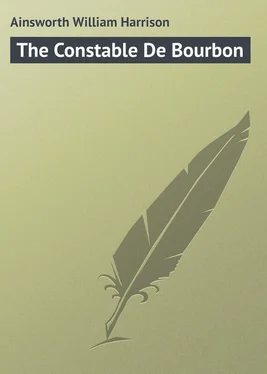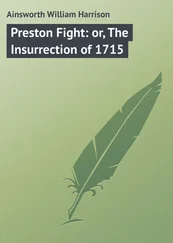William Ainsworth - The Constable De Bourbon
Здесь есть возможность читать онлайн «William Ainsworth - The Constable De Bourbon» — ознакомительный отрывок электронной книги совершенно бесплатно, а после прочтения отрывка купить полную версию. В некоторых случаях можно слушать аудио, скачать через торрент в формате fb2 и присутствует краткое содержание. ISBN: , Жанр: foreign_prose, на английском языке. Описание произведения, (предисловие) а так же отзывы посетителей доступны на портале библиотеки ЛибКат.
- Название:The Constable De Bourbon
- Автор:
- Жанр:
- Год:неизвестен
- ISBN:http://www.gutenberg.org/ebooks/49681
- Рейтинг книги:3 / 5. Голосов: 1
-
Избранное:Добавить в избранное
- Отзывы:
-
Ваша оценка:
- 60
- 1
- 2
- 3
- 4
- 5
The Constable De Bourbon: краткое содержание, описание и аннотация
Предлагаем к чтению аннотацию, описание, краткое содержание или предисловие (зависит от того, что написал сам автор книги «The Constable De Bourbon»). Если вы не нашли необходимую информацию о книге — напишите в комментариях, мы постараемся отыскать её.
The Constable De Bourbon — читать онлайн ознакомительный отрывок
Ниже представлен текст книги, разбитый по страницам. Система сохранения места последней прочитанной страницы, позволяет с удобством читать онлайн бесплатно книгу «The Constable De Bourbon», без необходимости каждый раз заново искать на чём Вы остановились. Поставьте закладку, и сможете в любой момент перейти на страницу, на которой закончили чтение.
Интервал:
Закладка:
On the third night after his arrival at Montbrison, while he was seated at supper with his retainers in the great banqueting-hall of the château, two strangers, who described themselves as merchants of Lyons, who were travelling to Clermont, claimed his hospitality.
The Constable at once gave them welcome, and assigned them seats at the lower table. Their attire accorded with the account they gave of themselves, but their bearing proclaimed them persons of rank, and Bourbon easily detected in one of them, a handsome, dark-complexioned man, with fine eyes and a very intelligent countenance, the Seigneur de Beaurain; while, though he was wholly unacquainted with the other – a well-made, but somewhat robust personage, with a bright fresh colour and light-brown locks – he judged him to be Sir John Russell, and he was right in the conjecture.
At the close of the meal, the Constable expressed a desire to converse with his new guests, and requested them to follow him to his private cabinet.
As soon as the door was closed, all disguise was thrown aside, and Bourbon cordially welcomed Beaurain, and expressed the highest satisfaction at beholding the English envoy.
“I regret that I could not receive you in a manner befitting your rank, messeigneurs,” he said. “I do not think I have any spies amid my household, but it is necessary to be cautious. And now be seated, I pray you, and let us address ourselves to the matter in hand.”
“First, let me express the indignation which my royal master the Emperor feels at the infamous treatment experienced by your highness from the King of France,” said Beaurain – “treatment as injudicious as unworthy, and which fully justifies any reprisals you may make.”
“I have also to convey to your highness the expression of similar sentiments from my sovereign, King Henry VIII.,” added Sir John Russell. “His majesty is highly indignant.”
“I have not merely my own private wrongs to redress, messeigneurs,” replied Bourbon, “but those of my country, which is suffering from bad government and oppression, and half ruined by a luxurious monarch, who ravages the people to enrich his mistresses and favourites. François de Valois is unworthy to occupy the throne of France.”
“He shall not occupy it long,” replied Beaurain, with a significant smile. “But before proceeding further, let me offer my credentials to your highness. Here is a letter from the Emperor,” he added, delivering a despatch to the Constable.
Bourbon took it, broke the seal, and read as follows:
“Cousin, – I send you the Sieur de Beaurain, my second chamberlain. Believe him as you would believe me, and doing so you will find me always your good cousin and friend,
“Charles.”
“I am furnished by my august sovereign, King Henry VIII., with full powers to treat with your highness, as this letter will prove,” said Sir John Russell, likewise delivering a despatch to the Constable.
“Enough, messires,” observed Bourbon, after he had perused the second despatch, which was couched in nearly similar terms to the first. “These letters, though brief, are all I could desire.”
“It is scarcely necessary for me to observe to your highness,” said Beaurain, “that the Emperor my master, and his Majesty the King of England, are acting conjointly in this matter. As you are aware, they have entered into a league offensive and defensive against France, and in this league they propose to include your highness.”
“I am ready to engage in war against François I.,” remarked Bourbon; “but, whatever may be the issue of the contest, I cannot consent to recognise Henry VIII. as King of France.”
“Such recognition will not be required of your highness,” observed Sir John Russell. “France will exist no longer. The realm will be divided between the three allies. The north will fall to the share of my royal master. The centre of the kingdom will be yours. The south will appertain to the Emperor.”
“The partition can be discussed hereafter,” rejoined Beaurain. “The kingdom must be conquered ere it can be divided. It is proposed that the invasion shall take place in this manner. The Emperor will penetrate France from Narbonne with eighteen thousand Spaniards, ten thousand German lanz-knechts, two thousand men of arms, and four thousand lances. Simultaneously with this attack, Henry VIII. will place fifteen thousand archers and five hundred horsemen in Picardy, and this force will be further augmented by six thousand men from the Low Countries. The invasion will take place when François is occupied with the expedition to Italy. Not till ten days after the kingdom has been attacked at either extremity by Spain and England shall your highness raise the standard of rebellion, for fear of misadventure. At the expiration of that time you shall declare yourself. You will be aided by ten thousand lanz-knechts, enrolled for you in Germany, who will enter France through Bresse.”
“I approve the plan,” said Bourbon. “But by whom are the lanz-knechts to be paid?”
“The Emperor and his Majesty King Henry VIII. engage to furnish your highness with two hundred thousand crowns for their payment,” returned Beaurain. “And the two monarchs further engage to sustain your highness against all your enemies, and to conclude no truce or treaty in which you are not comprehended.”
“I am content,” observed Bourbon.
“I trust your highness will be well satisfied with what I have further to propose,” pursued Beaurain. “In order to prove the high esteem in which he holds you, the Emperor has commissioned me to offer you in marriage his sister, the widowed Queen of Portugal, with a dower of two hundred thousand crowns, without counting her own rental of twenty thousand crowns, besides jewels for five or six hundred thousand more. Or, if your highness prefer the Emperor’s younger sister, the Infanta Catalina, you may have her, with a like dower. All his Imperial Majesty requires in return is, that you shall unite yourself with him against all other persons, without exception.”
“I choose the fair Queen of Portugal,” replied Bourbon; “and I will give her as a dowry the Beaujolais, which produces twenty thousand crowns of revenue. I take you both to witness,” he added, “that I now renounce my fealty to François I. I cast off my allegiance to that false and perfidious king, and transfer it to the Emperor Charles V.”
“We attest your highness’s renunciation,” said both envoys, solemnly.
“And I accept your allegiance in the name of the Emperor,” added Beaurain, with a look of satisfaction.
“Nothing now remains but to prepare the treaty,” said Bourbon to the Imperial envoy.
Beaurain did not require a second order. Writing materials were on the table beside him, and he rapidly performed his task. The document having been approved by Bourbon and Sir John Russell, two copies were made of it, and when all had been duly signed, as well by the Constable as by the envoys, each retaining a copy, Beaurain observed, with a smile, “Your highness is now pledged to us.”
“I am bound to revolt and vengeance,” replied Bourbon, “and my kingly allies will aid me in my work. Hitherto, my device has been — Spes . Henceforth,” he added, unsheathing his sword, and kissing the blade, “it shall be – ‘ Omnis spes in ferro est .’”
Perfectly satisfied, the envoys were about to withdraw, when Bourbon detained them.
“Stay a moment, messeigneurs,” he said. “I must send a messenger to the Emperor.”
With this he sat down and wrote a letter, and, having sealed it, he summoned the Sieur de Bruzon, a gentleman entirely in his confidence, and said to him:
“The Seigneur de Beaurain, whom I here present to you, comes as an ambassador from the Emperor, to offer me the Queen of Portugal in marriage. You will accompany him on his return, and will deliver this letter into the hands of his Imperial Majesty, saying that I recommend myself very humbly to his good grace, and thank him heartily for the signal honour he has shown me in offering me his sister. Add, that he will ever find me his good brother and friend. Say this to him.”
Читать дальшеИнтервал:
Закладка:
Похожие книги на «The Constable De Bourbon»
Представляем Вашему вниманию похожие книги на «The Constable De Bourbon» списком для выбора. Мы отобрали схожую по названию и смыслу литературу в надежде предоставить читателям больше вариантов отыскать новые, интересные, ещё непрочитанные произведения.
Обсуждение, отзывы о книге «The Constable De Bourbon» и просто собственные мнения читателей. Оставьте ваши комментарии, напишите, что Вы думаете о произведении, его смысле или главных героях. Укажите что конкретно понравилось, а что нет, и почему Вы так считаете.












